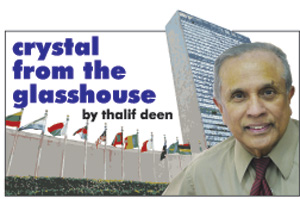Sunday Times 2
Climate crisis and country with a date of expiry
View(s):UNITED NATIONS— When world leaders meet at the United Nations on April 22 to sign a historic climate change treaty, the implementation of that agreement to curb greenhouse gas emissions will determine the fate of several small island states, including Tuvalu, Kiribati and the Maldives, which are in danger of sinking due to a sea-level rise.

Visitors take a selfie at the exhibition stand of the Maldives at the International Tourism Trade Fair (ITB) in Berlin, Germany, March 9. Reuters
As the National Geographic magazine summed it up last month: “If you were faced with the threat of the disappearance of your nation, what would you do?” Pray for salvation? Try to amend the 1951 Refugee Convention, adding a new category of “environmental refugees” fleeing countries before they sink. Or does that amount to re-arranging the deck chairs on the Titanic?
At a meeting of the Commonwealth Heads of Government (CHOGM) in Kuala Lumpur in October 1989, the Maldives’ then President, Maumoon Abdul Gayoom, (1978-2008) warned if his tiny island nation is to host the annual conference in the not-too-distant future, chances are the world’s leaders will have to meet in the bottom of the Indian Ocean-probably in scuba-diving gear.
Ahmed Sareer, the current Permanent Representative of the Maldives, and Ambassador to the United States, has been keeping the environmental issue alive as chairman of the Alliance of Small Island States (AOSIS).
The Maldivian economy which had grown at an average of 8 percent per annum for two consecutive years, he said last year, was devastated by the 2004 tsunami: 62% of the gross domestic product (GDP) was destroyed; over 7% of the population was internally displaced; social and economic infrastructure damaged or destroyed in over one quarter of the inhabited islands; 12 inhabited islands were turned into complete rubble.
A country that depends largely on tourism, shipping and fishing has steadily recovered from the devastation, but still in danger of a future climate-induced catastrophe. The late Fathulla Jameel, a former Permanent Representative of the Maldives and later the country’s Foreign Minister for over 27 long years, had a riveting sense of humour even in times of adversity.
Whenever he addressed the UN General Assembly, he repeatedly singled out the dangers facing his island nation. “The Maldives is like a can of tuna fish” he once told a journalist, “because it comes with an expiry date”.
 The basic human right for the Maldivians was the right to survival. But it was a relentless battle against severe environmental odds. ”Our priority may be different from the others. We have to first survive before we could enjoy all the other basic human rights. But we have never neglected one for the other,” he said.
The basic human right for the Maldivians was the right to survival. But it was a relentless battle against severe environmental odds. ”Our priority may be different from the others. We have to first survive before we could enjoy all the other basic human rights. But we have never neglected one for the other,” he said.
Fathulla argued that the tragedy of small island nations is that countries such as the Maldives had contributed absolutely nothing to the degradation of the world’s environment. But still, paying the penalty for the environmental crimes of others.”My appeal is to the international community to recognise that we, the small island states, have the same right of survival and protection as any other member of this community.”
A fluent speaker in Arabic, Fathulla was educated at the Al-Azhar University in Cairo where he graduated with a Bachelor of Arts degree in Philosophy and Islamic Studies. As Foreign Minister, he travelled widely, mostly in the Middle East, and recounted his meetings with Arab leaders even as he picked up hilarious anecdotes between various capitals.
After one of his visits to the Middle East, he recounted the oft-quoted story of Libyan leader Muammar Gaddafi’s longtime visions of a pan-Arab Islamic federation — a goal that eluded even the charismatic Egyptian president Gamal Abdel Nasser. At various times, Gaddafi tried to form Arab federations linking his country with Egypt, Sudan, Syria, Tunisia, Morocco, Chad and Algeria. But his ambitious plans never got off the ground.
When he visited China in the early 1980s, as Fathulla recounted the story, Gaddafi plucked up courage to ask the Chinese leader Deng Xiaoping about a possible federation between Libya and China. China’s supreme leader, who was then presiding over a country with over 900 million people, pondered for a while and asked Gaddafi how big his country was.
Told that Libya’s population at that time was only a paltry three million people, Deng put his arm around Gaddafi and said rather affectionately: “When you next visit Beijing, why don’t you bring them along with you.”
Incidentally, the Wall Street Journal once ran a cartoon of a journalist trying to unravel the mystery behind the different spellings of the Libyan leader’s last name because copy editors went bananas trying to figure out the correct one.
The cartoon showed a meek-looking reporter telling the Libyan leader: “I was sent by my editor to find out whether you are Qaddafi, Khadafi or Gaddafi?” The mystery remains even long after his death in October 2011.
Having covered the UN since my student days in the 1970s, I had established strong personal and professional ties with the Maldives, especially with two Maldivian Ambassadors.
While being Prime Minister, Zaki was banished to an uninhabited island for nearly 20 months, with only two guards watching over him to make sure he did not escape, as he recounted the story back in 1979.
But after a change in government, the man in the lonely island, ironically, found himself as the Maldivian ambassador in New York populated with over 7.8 million people. The Hong Kong-based Asiaweek magazine ran the story with the headline: The Pits and the Pendulum.
Incidentally, the Maldivian delegation to the UN General Assembly sessions comprised relatively young diplomats who made their annual pilgrimage to New York every September. At one of the briefings in the Maldivian Mission, so the story goes, Ambassador Zaki told the new comers: “When you are in New York, there are only two things you should know: where the UN is located and who Mr. Deen is?”
That was good for my journalistic ego, until the sharp-witted Fathulla told me later, the ambassador had also added the zinger: “Because I want you to avoid him”.
The writer can be contacted at thalifdeen@aol.com

